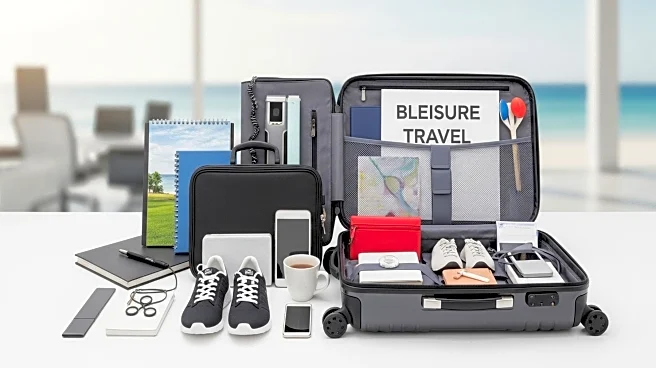What is the story about?
What's Happening?
Bleisure travel, the practice of combining business trips with leisure activities, is experiencing significant growth in 2025. According to Navan's analysis, the global bleisure market is expected to more than double by 2032, driven by a rise in demand for work-life balance and digital transformation in the travel industry. Companies are increasingly adopting flexible travel policies, encouraging employees to extend their trips for leisure purposes. This trend is reshaping corporate travel, with 54% of business travelers taking at least two bleisure trips in 2024. The data shows that bleisure travel enhances employee satisfaction, productivity, and well-being, making it a valuable corporate perk.
Why It's Important?
The rise of bleisure travel is significant for businesses, as it presents opportunities to enhance employee satisfaction and retention. By accommodating bleisure travel, companies can foster a positive corporate culture and attract top talent. The trend also benefits employees by providing opportunities for personal enrichment and relaxation, reducing stress and enhancing job satisfaction. Bleisure travel supports work-life balance, making business trips more appealing and productive. As companies embrace this trend, they can gain a competitive edge in talent recruitment and retention.
What's Next?
As bleisure travel continues to grow, companies are expected to further adapt their corporate travel policies to accommodate this trend. This includes offering stipends for personal vacations and promoting work-life balance. The trend is likely to expand beyond millennials, attracting Gen Z and other demographics who value flexibility and enriching travel experiences. Travel companies may also adapt their offerings to cater to bleisure travelers, providing personalized experiences and unique leisure activities.
Beyond the Headlines
Bleisure travel reflects a broader cultural shift towards prioritizing employee well-being and work-life balance. It challenges traditional notions of business travel, encouraging a more holistic approach that integrates personal fulfillment with professional obligations. This trend may lead to long-term changes in corporate travel policies and the travel industry's approach to customer service, emphasizing the importance of personalized and enriching experiences.















